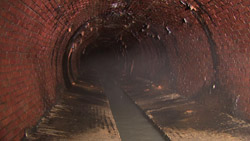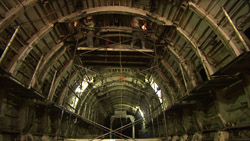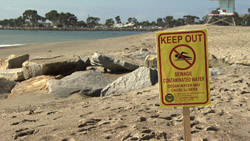Press Room
- Press Release
- Logos
- Photos
[Download this release in Rich Text Format]
For Immediate Release
Penn State Public Broadcasting Documentary on Nation’s Deteriorating Water Infrastructure to Air Nationally Starting in October
Experts fear aging national water infrastructure system is under stress and on the verge of failure
University Park, PA—It is out of sight and out of mind, but America’s aging water system is in dire need of an overhaul. Penn State Public Broadcasting (WPSU-TV) is set to premiere a public television event on the looming crisis underneath our feet and how communities are trying to meet this challenge. "Liquid Assets: The Story of Our Water Infrastructure," tells of America’s distressed essential infrastructure systems: drinking water, wastewater, and stormwater. These complex and aging systems—some in the ground for more than 150 years—are critical components for basic sanitation, health, public safety, economic development, and a host of other necessities of life. A four-minute trailer is available for viewing now at http://liquidassets.psu.edu online.
The 90-minute documentary will be available nationwide to all public broadcasting stations beginning October 1, 2008.
"The goal of this public service media project is to stimulate community discussion and bring this issue into the public consciousness using television as a catalyst," said executive producer of the documentary, Tom Keiter. "We want 'Liquid Assets' to be more than just a broadcast."
The documentary explores major water, sewage, and stormwater infrastructure issues facing communities across the country, including:
- :: Atlanta
- :: Boston
- :: Herminie, Pennsylvania
- :: Las Vegas
- :: Los Angeles
- :: Milwaukee
- :: New York City
- :: Philadelphia
- :: Pittsburgh
- :: Washington, D.C.
Accompanying the documentary is an online companion toolkit, intended to help facilitate discussions that extend beyond the broadcast. The community toolkit, also available at http://liquidassets.psu.edu, includes an outreach guide and other resources to complement the documentary.
"Liquid Assets" will also be available on DVD on through Penn State Media Sales for $24.95 plus shipping and handling. It can be ordered by calling 1-800-770-2111 or by visiting http://mediasales.psu.edu.
"Liquid Assets" is a production of WPSU, Penn State Public Broadcasting. Executive Producer: Tom Keiter. Project Director: Melanie Doebler. Producer: Stephanie Ayanian. Writers/Directors: Stephanie Ayanian and Mark Cooper. Project Manager: Elaine Brzycki. Director of Photography: Ryan Witt. Editor: Greg Feinberg.
Major funding for the "Liquid Assets" documentary was provided by the Colcom Foundation, with additional funding from the Associated General Contractors of America, the American Society of Civil Engineers and its Environmental & Water Resources Institute, Insituform Technologies, and the National Association of Clean Water Agencies.
Support for community outreach efforts was provided by National Association of Water Companies, Water Environment Federation, Uni-Bell PVC Pipe Association, 3 Rivers Wet Weather, American Public Works Association, American Water Works Association, CH2M HILL, Ductile Iron Pipe Research Association, Gannett Fleming, National Association of Sewer Service Companies, National Utility Contractors Association, Northwest Pipe Company, and Plastics Pipe Institute.
For more information on the airing of "Liquid Assets" or for media interviews, please contact Dave Aneckstein, Penn State Outreach, dxa141@outreach.psu.edu or 814-865-7600.
About WPSU
WPSU, Penn State Public Broadcasting is part of Penn State Outreach, the largest unified outreach organization in the world. As a broadcaster licensed to one of the largest land grant research universities in the country, WPSU is committed to the concept of public service media: developing non-commercial programming on important societal issues and helping to foster community discussions in concurrence with the broadcast. “Liquid Assets” originated from conversations between Penn State Public Broadcasting and the Penn State Department of Civil and Environmental Engineering. The 90-minute documentary is available nationwide to all public broadcasting stations at no cost through the National Educational Telecommunications Association (NETA) beginning October 1, 2008 with unlimited broadcast rights though September 2011. The program is available in HD and SD versions.
###

Download Logo .zip file (contains .ai, .pdf, .tif)

Download Logo (Reverse).zip file (contains .ai, .pdf)

Download Wordmark .zip file (contains .ai, .pdf, .tif)

A historic Boston sewer dating back to the 1800s is still in use today. Download Photo

Atlanta’s combined waste and stormwater system overloads during heavy rain, rushing raw sewage into the Chattahoochee River, which supplies the city’s drinking water. The city is currently building a massive tunnel to store the water until it can be properly treated. Download Photo

Jim Ryan, president of Local 147, New York City’s sandhogs’ union, explains the Water Tunnel 3 project in Manhattan, which began in 1969. Tunnel 3 reaches a depth of 1,000 feet below the surface of the city and will provide an alternate method for delivering drinking water to residents and businesses. The project’s anticipated completion date is 2012. Download Photo

Beaches in southern California may be closed due to the threat of polluted and contaminated stormwater reaching the Pacific Ocean. Download Photo

Steve Allbee from the U.S. Environmental Protection Agency explains the billions of dollars that will be required to maintain America’s two million miles of pipes during the next 20 years. Download Photo

Sunil Sinha, associate professor at Virginia Tech, discusses how municipalities can use asset management to invest in and maintain their water infrastructure systems. Download Photo
More Information
For more information, contact Greg Petersen, gregp@psu.edu, 814-863-4011.

